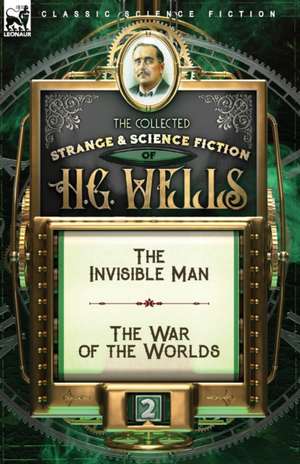The Collected Strange & Science Fiction of H. G. Wells
Autor H. G. Wellsen Limba Engleză Paperback – 13 ian 2020
| Toate formatele și edițiile | Preț | Express |
|---|---|---|
| Paperback (6) | 118.71 lei 6-8 săpt. | |
| Leonaur Ltd – 13 ian 2020 | 118.71 lei 6-8 săpt. | |
| Leonaur Ltd – 13 ian 2020 | 119.65 lei 6-8 săpt. | |
| Leonaur Ltd – 13 ian 2020 | 120.46 lei 6-8 săpt. | |
| Leonaur Ltd – 14 ian 2020 | 131.80 lei 6-8 săpt. | |
| Leonaur Ltd – 13 ian 2020 | 142.38 lei 6-8 săpt. | |
| Leonaur Ltd – 13 ian 2020 | 143.19 lei 6-8 săpt. | |
| Hardback (6) | 195.81 lei 6-8 săpt. | |
| Leonaur Ltd – 14 ian 2020 | 195.81 lei 6-8 săpt. | |
| Leonaur Ltd – 14 ian 2020 | 196.96 lei 6-8 săpt. | |
| Leonaur Ltd – 14 ian 2020 | 197.89 lei 6-8 săpt. | |
| Leonaur Ltd – 14 ian 2020 | 209.58 lei 6-8 săpt. | |
| Leonaur Ltd – 14 ian 2020 | 220.42 lei 6-8 săpt. | |
| Leonaur Ltd – 14 ian 2020 | 221.14 lei 6-8 săpt. |
Preț: 118.71 lei
Nou
Puncte Express: 178
Preț estimativ în valută:
22.72€ • 23.67$ • 18.81£
22.72€ • 23.67$ • 18.81£
Carte tipărită la comandă
Livrare economică 03-17 aprilie
Preluare comenzi: 021 569.72.76
Specificații
ISBN-13: 9781782828556
ISBN-10: 1782828559
Pagini: 268
Dimensiuni: 140 x 216 x 17 mm
Greutate: 0.35 kg
Editura: Leonaur Ltd
ISBN-10: 1782828559
Pagini: 268
Dimensiuni: 140 x 216 x 17 mm
Greutate: 0.35 kg
Editura: Leonaur Ltd
Notă biografică
Herbert George Wells (21 September 1866 - 13 August 1946) was an English writer. Prolific in many genres, he wrote dozens of novels, short stories, and works of social commentary, history, satire, biography and autobiography. His work also included two books on recreational war games. Wells is now best remembered for his science fiction novels and is often called the "father of science fiction", along with Jules Verne and the publisher Hugo Gernsback.
During his own lifetime, however, he was most prominent as a forward-looking, even prophetic social critic who devoted his literary talents to the development of a progressive vision on a global scale. A futurist, he wrote a number of utopian works and foresaw the advent of aircraft, tanks, space travel, nuclear weapons, satellite television and something resembling the World Wide Web. His science fiction imagined time travel, alien invasion, invisibility, and biological engineering. Brian Aldiss referred to Wells as the "Shakespeare of science fiction". Wells rendered his works convincing by instilling commonplace detail alongside a single extraordinary assumption - dubbed "Wells's law" - leading Joseph Conrad to hail him in 1898 as "O Realist of the Fantastic!". His most notable science fiction works include The Time Machine (1895), The Island of Doctor Moreau (1896), The Invisible Man (1897), The War of the Worlds (1898) and the military science fiction The War in the Air (1907). Wells was nominated for the Nobel Prize in Literature four times.
Wells's earliest specialised training was in biology, and his thinking on ethical matters took place in a specifically and fundamentally Darwinian context.[9] He was also from an early date an outspoken socialist, often (but not always, as at the beginning of the First World War) sympathising with pacifist views. His later works became increasingly political and didactic, and he wrote little science fiction, while he sometimes indicated on official documents that his profession was that of journalist.Novels such as Kipps and The History of Mr Polly, which describe lower-middle-class life, led to the suggestion that he was a worthy successor to Charles Dickens, but Wells described a range of social strata and even attempted, in Tono-Bungay (1909), a diagnosis of English society as a whole. Wells was a diabetic and co-founded the charity The Diabetic Association (known today as Diabetes UK) in 1934.
During his own lifetime, however, he was most prominent as a forward-looking, even prophetic social critic who devoted his literary talents to the development of a progressive vision on a global scale. A futurist, he wrote a number of utopian works and foresaw the advent of aircraft, tanks, space travel, nuclear weapons, satellite television and something resembling the World Wide Web. His science fiction imagined time travel, alien invasion, invisibility, and biological engineering. Brian Aldiss referred to Wells as the "Shakespeare of science fiction". Wells rendered his works convincing by instilling commonplace detail alongside a single extraordinary assumption - dubbed "Wells's law" - leading Joseph Conrad to hail him in 1898 as "O Realist of the Fantastic!". His most notable science fiction works include The Time Machine (1895), The Island of Doctor Moreau (1896), The Invisible Man (1897), The War of the Worlds (1898) and the military science fiction The War in the Air (1907). Wells was nominated for the Nobel Prize in Literature four times.
Wells's earliest specialised training was in biology, and his thinking on ethical matters took place in a specifically and fundamentally Darwinian context.[9] He was also from an early date an outspoken socialist, often (but not always, as at the beginning of the First World War) sympathising with pacifist views. His later works became increasingly political and didactic, and he wrote little science fiction, while he sometimes indicated on official documents that his profession was that of journalist.Novels such as Kipps and The History of Mr Polly, which describe lower-middle-class life, led to the suggestion that he was a worthy successor to Charles Dickens, but Wells described a range of social strata and even attempted, in Tono-Bungay (1909), a diagnosis of English society as a whole. Wells was a diabetic and co-founded the charity The Diabetic Association (known today as Diabetes UK) in 1934.
